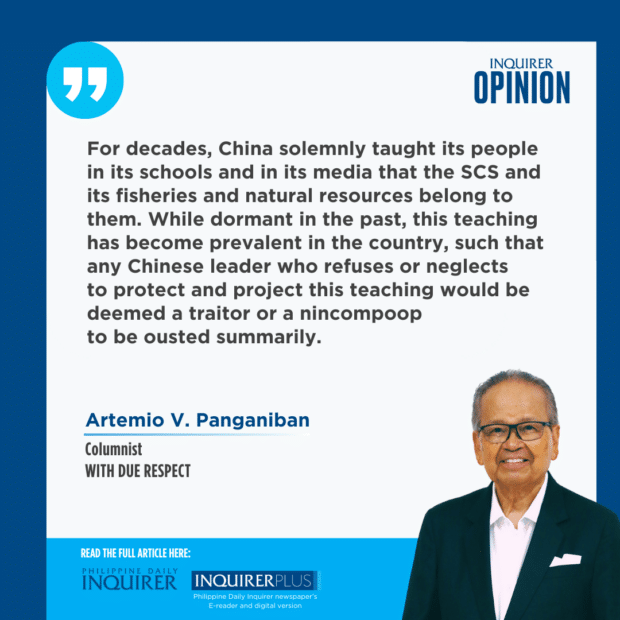Protecting and projecting national interest

Why is China—a signatory to the United Nations Convention on the Law of the Sea (Unclos) and a party-litigant (that chose to be legally in default but indirectly participated through official statements of its spokespersons) in the 2016 Arbitral Award—militarizing the South China Sea and why does it not recognize and obey the AA that invalidated China’s nine-dash line and upheld freedom of navigation in the SCS? And why does the United States—though not a signatory to Unclos and though not a party-litigant in the AA—enforce, together with its allies like Australia, France, Germany, and Great Britain, freedom of navigation in the SCS? So, I asked rhetorically in last Monday’s column (“The Maritime Zones Act, Asean, and China”).
THE UNSAID SHORT AND SIMPLE ANSWER IS “NATIONAL INTEREST.” All states, including the Philippines, always act to protect and project what is beneficial to them and to their people. National interest is not constant. It shifts according to the present and future political, economic, security, and social aspirations of, and sometimes turmoil in, a country.
For decades, China solemnly taught its people in its schools and in its media that the SCS and its fisheries and natural resources belong to them. While dormant in the past, this teaching has become prevalent in the country, such that any Chinese leader who refuses or neglects to protect and project this teaching would be deemed a traitor or a nincompoop to be ousted summarily.
Moreover, China boasts of a robust civilization antedating many Western powers like Great Britain and Portugal that enslaved it and occupied portions of its territory under long-term leases like Hong Kong and Macau and that ignored its dormant but simmering desire to become a respected world power again.
And indeed, it has meteorically risen from utter poverty and slavery to become the second biggest economy in the world that aspires to be on equal, if not better, footing with the West. And one way to achieve this ambition is to propel its military might to the Pacific Ocean through domination of the SCS. In the process, it has crossed the maritime entitlements of the states bordering the SCS—Vietnam, Thailand, Malaysia, Singapore, Indonesia, and the Philippines that among themselves have separate territorial and maritime disputes.
THE UNITED STATES, TOO, HAS CHANGED ITS ASPIRATIONS from neutrality (though covertly assisting the European powers) in the military aggressions of Adolf Hitler that started on Sept. 1, 1939, with the German blitzkrieg on Poland only to be drawn fully into it by the sneak attack on Pearl Harbor by the Japanese Imperial Navy on Dec. 7, 1941. After the unconditional surrender of Germany and later of Japan on Sept. 2, 1945, the US, as the leader of the victorious allies, expanded its reach to all parts of the world thereby making Pax Americana and the institution of American-style democracy, libertarianism, capitalism, and free trade among both its allies and erstwhile enemies as its national interest.
From then on, the US spent trillions of dollars—much of it borrowed domestically and, ironically, from China—and planted American boots on the battlegrounds of Korea, Vietnam, Afghanistan, and Iraq. Election after election since then, the American foreign policy and its perception of its national interest had not materially changed.
But during the elections last Nov. 5, the Americans got tired of being the peacekeepers of the world and of gradually losing economic dominance to the surging Chinese. Now, Donald Trump emerged and advocated to “Make America Great Again” as their national interest and demanded that their allies share the cost of peacekeeping. So, too, Trump vowed to undertake mass deportation of illegal migrants whom he accused of stealing American jobs and of waging criminality in American cities, hills, and plains. Verily, he loves being a disruptor.
IN 2016, THE FILIPINOS, TOO, GOT TIRED OF THE DEMOCRATIC IDEALS of compromise and free elections that were controlled by dynasties and “imperial Manila.” They welcomed the feisty, even autocratic, rule of Rodrigo Duterte. He veered to China as the true ally and abandoned the friendship and military protection of the US. But, lo and behold, his grip on power was limited to six years and a new leader emerged, Ferdinand Marcos Jr., who reverted to America as our country’s ally in protecting and advancing our national interest especially in preserving our entitlements to the fisheries and natural resources in the West Philippine Sea.
Clearly, our national interest shifted from America to China and back to America. This see-sawing shifts in our national interest seem to be backed up by the landslide victory of Duterte in 2016 only to be overcome by the even more lopsided win of Marcos Jr., who gathered, for the first time under our 1987 Constitution, an absolute majority (well over 50 percent) of the ballots cast in the 2022 election.
With his overwhelming mandate, President Marcos can indeed lead in the protection and projection of our national interest vis-à-vis our Asean neighbors, China, the US, and the world.
—————
Comments to chiefjusticepanganiban@hotmail.com




















